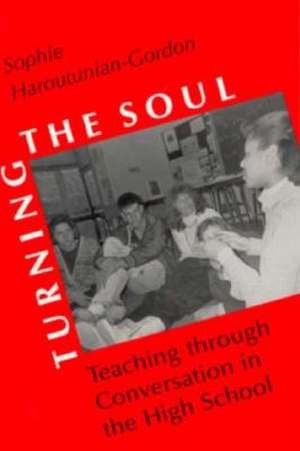Turning the Soul: Teaching through Conversation in the High School
Autor Sophie Haroutunian-Gordonen Limba Engleză Paperback – 31 ian 1991
Is our nation's educational system faltering in part because it strives to teach students predetermined "right" answers to questions? In Turning the Soul, Sophie Haroutunian-Gordon offers and alternative to methods advocated by conventional educational practice. By guiding the reader back and forth between two high school classes discussing Shakespeare's Romeo and Juliet, she gracefully introduces the alternative approach to education: interpretive discussion.
One class, located in a private, racially integrated urban school, has had many conversations about the meaning of books. The second group, less advantaged students in a largely black urban school, has not. The reader watches as students in each group begin to draw upon experiences in their personal lives to speculate about events in the play. The students assist one another with the interpretation of complex passages, pose queries that help sustain the conversation, and struggle to "get Shakespeare right." Though the teachers suffer moments of intense frustration, they are rewarded by seeing their students learn to engage in meaningful exchange.
Because Turning the Soul draws on actual classroom conversations, it presents the range of difficulties that one encounters in interpretive discussion. The book describes the assumptions about learning that the use of such discussion in the classroom presupposes, and it offers a theoretical perspective from which to view the changes in both students and teachers.
One class, located in a private, racially integrated urban school, has had many conversations about the meaning of books. The second group, less advantaged students in a largely black urban school, has not. The reader watches as students in each group begin to draw upon experiences in their personal lives to speculate about events in the play. The students assist one another with the interpretation of complex passages, pose queries that help sustain the conversation, and struggle to "get Shakespeare right." Though the teachers suffer moments of intense frustration, they are rewarded by seeing their students learn to engage in meaningful exchange.
Because Turning the Soul draws on actual classroom conversations, it presents the range of difficulties that one encounters in interpretive discussion. The book describes the assumptions about learning that the use of such discussion in the classroom presupposes, and it offers a theoretical perspective from which to view the changes in both students and teachers.
Preț: 165.99 lei
Preț vechi: 206.82 lei
-20% Nou
Puncte Express: 249
Preț estimativ în valută:
31.77€ • 32.98$ • 26.49£
31.77€ • 32.98$ • 26.49£
Carte indisponibilă temporar
Doresc să fiu notificat când acest titlu va fi disponibil:
Se trimite...
Preluare comenzi: 021 569.72.76
Specificații
ISBN-13: 9780226316765
ISBN-10: 0226316769
Pagini: 224
Dimensiuni: 152 x 229 x 25 mm
Greutate: 0.32 kg
Ediția:1
Editura: University of Chicago Press
Colecția University of Chicago Press
ISBN-10: 0226316769
Pagini: 224
Dimensiuni: 152 x 229 x 25 mm
Greutate: 0.32 kg
Ediția:1
Editura: University of Chicago Press
Colecția University of Chicago Press
Notă biografică
Sophie Haroutunian-Gordon, who taught in the public schools for five years, is now assistant professor of education at the University of Chicago. She is coeditor of From Socrates to Software: The Teacher as Textand theText as Teacher.
Cuprins
Acknowledgments
Introduction: Teaching through Conversation
Part One: Interpretive Discussion in the School
Conversation 1: An Introduction to Chalmers and Belden Schools
Conversation 2: Why Do Teachers Fail to Draw upon Students' Experiences in Discussion?
Conversation 3: What Does a Good Interpretive Discussion Look Like?
Part Two: How Are Students and Teachers Transformed through Discussion?
Conversation 4: The "Phony" Issue
Conversation 5: The "Genuine" Issue
Conversation 6: The Group Emerges
Conversation 7: The Evaluative Discussion
Conversation 8: Getting It "Right"
Part Three: How Do Students Learn to Build an Interpretation?
Conversation 9: Getting It "Wrong"
Conversation 10: Getting It "Right" (Again)
Conclusion: Problems and Possibilities
Notes
Index
Introduction: Teaching through Conversation
Part One: Interpretive Discussion in the School
Conversation 1: An Introduction to Chalmers and Belden Schools
Conversation 2: Why Do Teachers Fail to Draw upon Students' Experiences in Discussion?
Conversation 3: What Does a Good Interpretive Discussion Look Like?
Part Two: How Are Students and Teachers Transformed through Discussion?
Conversation 4: The "Phony" Issue
Conversation 5: The "Genuine" Issue
Conversation 6: The Group Emerges
Conversation 7: The Evaluative Discussion
Conversation 8: Getting It "Right"
Part Three: How Do Students Learn to Build an Interpretation?
Conversation 9: Getting It "Wrong"
Conversation 10: Getting It "Right" (Again)
Conclusion: Problems and Possibilities
Notes
Index
